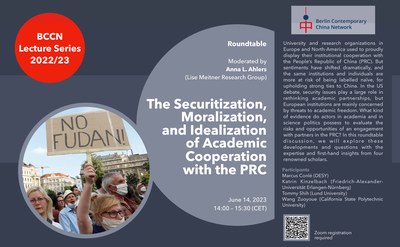14.06.2023 BCCN Roundtable: "The Securitization, Moralization, and Idealization of Academic Cooperation with the PRC"
- https://www.iaaw.hu-berlin.de/de/region/ostasien/aktuelles/aktuelle-termine/14-06-2023-bccn-roundtable-the-securitization-moralization-and-idealization-of-academic-cooperation-with-the-prc
- 14.06.2023 BCCN Roundtable: "The Securitization, Moralization, and Idealization of Academic Cooperation with the PRC"
- 2023-06-14T14:00:00+02:00
- 2023-06-14T15:30:00+02:00
- Wann 14.06.2023 von 14:00 bis 15:30
- Wo Online via Zoom
- Name des Kontakts Sarah Eaton
-
iCal
Dear students and colleagues,
You are cordially invited to the final talk in the BCCN Online Lecture Series 2022/23 "China – The New Science Superpower?":
Roundtable: The Securitization, Moralization, and Idealization of Academic Cooperation with the PRC
Marcus Conlé (DESY)
Katrin Kinzelbach (Friedrich-Alexander-Universität Erlangen-Nürnberg)
Tommy Shih (Lund University)
Wang Zuoyoue (California State Polytechnic University)
June 14, 2023, 2:00 p.m. – 3:30 p.m. (CET)
A few years ago, university and research organizations in Europe and North-America proudly displayed their academic relations and institutional cooperation with the People’s Republic of China (PRC) as an asset and an achievement. Sentiments now, however, seem to have shifted dramatically, and the same institutions and individuals are more at risk of being labelled naïve, and in some cases unprincipled, in public discourse, for upholding strong ties to China. While in the US debate, security issues play the biggest role in rethinking academic partnerships and research cooperation, in Europe, institutions are so far mainly concerned by threats to academic freedom, it seems.
What caused these shifts? What different perspectives are there in the debate? What kind of evidence do actors in academia and in science politics possess to evaluate the situation and gauge the risks and opportunities of an engagement with partners in the PRC? What recalibrations have already been tried? And is this now really a new phase in global science relations, or are these normal oscillations under the influence of geopolitical dynamics? In this roundtable discussion, we will explore these developments and questions with the expertise and first-hand insights from four renowned scholars and seek to identify nuances in what seems to be an otherwise increasingly polarized debate.
Register for the event here: https://zoom.us/j/91890610657?pwd=SVpxbkZWQ3ZrNlhIWHlQSnZXRzR2UT09
Kind regards
Anna Ahlers, Sarah Eaton


